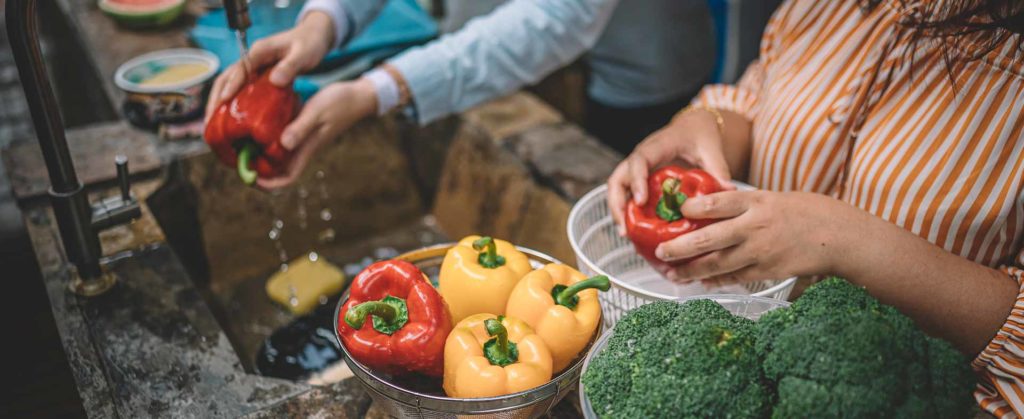
This article was provided by the Henry Ford LiveWell blog, a tool developed by Henry Ford Health System to feature health and wellness advice and insights on a variety of topics that encompass the whole person – body, mind and spirit.
You probably already know that foods nourish the body and help support a healthy immune system. But which foods should be at the top of your list during the COVID-19 pandemic?
“The government’s MyPlate is an ideal representation of how we should eat to support healthy immune function,” says Kelly Nohl, RDN, a registered dietitian nutritionist at Henry Ford Health System. “The focus is on maximizing fruits and vegetables and selecting lean sources of protein and dairy.”
Foods That Bolster The Immune System
The coronavirus pandemic has brought the idea of stockpiling healthful foods to the forefront. If you’re hitting the grocery store less than once per week, keeping fresh fruits and vegetables stocked may be challenging.
The good news: There are plenty of healthful options available, both fresh and frozen, to help meet your nutrient needs and bolster your immune system. A handful of Nohl’s favorites:
-
- Red bell peppers: When it comes to protecting the immune system, most people think of citrus fruits because they tend to be high in vitamin C. “A red bell pepper trumps oranges, grapefruit and lemons in terms of vitamin C content,” Nohl says. Other vitamin C-rich options include strawberries, kiwi and broccoli.
- Sweet potatoes: Sweet potatoes, particularly the ones with deep orange flesh, are very high in beta-carotene, a critical nutrient that the body converts to vitamin A. Vitamin A is critical to maintaining a healthy immune system.
- Water: “When it comes to staving off any type of cold or virus, maintaining adequate hydration is key,” Nohl says. In fact, getting sufficient fluids is even more important than nourishment from food. The reason? Our bodies are made mostly of water. Plus, fluids help ensure that our kidneys and liver — the organs that eliminate toxins and foreign bodies — function appropriately.
- Nuts and seeds: Nuts and seeds are not only a good source of healthy fats and protein, but they also contain disease-fighting vitamin E. A few go-to options: almonds, mixed nuts and peanut butter.
- Greek yogurt: Greek yogurt has the protein our bodies need for repair and rebuilding. It also provides probiotics, good bacteria that help promote a healthy GI tract, and it’s a great stand-in for sour cream. Just make sure to stick with plain. Flavored yogurts and yogurt drinks can contain more sugar than a serving of ice cream.
Foods That Weaken The Immune System
Protecting your immune system isn’t only about what you put in your body, but also what you keep out. “During the COVID-19 quarantine, many of us are turning to comfort foods to help manage emotions like stress, depression and anxiety,” Nohl says.
Unfortunately, diving into a bag of chips or a bowl of ice cream isn’t the best way to support your body when you’re feeling unsettled. Instead, try to limit these immune-sapping culprits:
-
- Sugar. Sugar is just empty calories. It contains no vitamins, minerals or disease-fighting nutrients. Eat too much and you may feel sluggish — often to the point where you need an additional pick-me-up.
- Caffeine. Having a cup or two of joe each day is okay, but it’s important to remember that caffeine is a stimulant, so it causes spasms in your GI tract. Also concerning is what else is going into your cup of coffee or tea. Pairing that caffeine with a hit of sugar could negatively impact your immune system.
- Alcohol. “Having a drink a day isn’t going to hijack your immune system,” Nohl says. But when one drink turns into two or three, your immune system may take the fall. Plus, people often make unhealthy food choices after they have a few drinks.
Immune-Savvy Eating
The best way to support your immune system is to follow a Mediterranean or DASH (Dietary Approaches to Stop Hypertension) diet. Load up on fresh fruits, vegetables and whole grains and select lean sources of protein and low-fat dairy. Limit foods that are high in sugar and saturated fat.
A few ideas for immune-boosting nourishment:
-
- Focus on frozen. If you’re only taking one grocery store trip every week or two, frozen fruits and veggies will sustain you.
- Plan ahead. Whether you’re working from home or heading out to the office, prepping food for the day can help ensure you make healthy choices.
- Keep healthy foods handy. Chop up fresh bell peppers, carrots and celery, wash fruit and have portion-controlled packs of nuts at the ready. That way you can grab a healthy snack with minimal effort.
Most important, make sure to mix things up. “You’ll get the best nutrient bang for your buck when you consume a variety of healthful foods rather than sticking with the same options,” Nohl says. Make room for herbs and spices, too. Garlic, onion, cinnamon, thyme, oregano and other flavoring agents contain powerful disease-fighting chemicals.